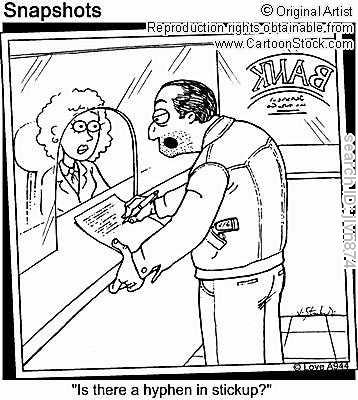Hyphen
Hyphen: is a punctuation mark ( – ) used between the parts of a compound word or name or between the syllables of a word, especially when divided at the end of a line of text.
Use hyphens for:
1. FRACTIONS (whether nouns or adjectives): two-thirds, four-fifths, one-sixth, etc.
2. MOST WORDS THAT BEGIN with anti, non and neo. Thus anti-aircraft, anti-fascist, anti-submarine (but antibiotic, anticlimax, antidote, antiseptic, antitrust); non-combatant, non-existent, non-payment, non-violent (but nonaligned, nonconformist, nonplussed, nonstop); neo-conservative, neo-liberal (but neoclassicism, neolithic, neologism).
Words beginning Euro should also be hyphenated, except Europhile, Europhobe and Eurosceptic; euro zone and euro area.
Some words that become unmanageably long with the addition of a prefix. Thus under-secretary and inter-governmental. Antidisestablishmentarianism would, however, lose its point if it were hyphenated.
A sum followed by the word worth also needs a hyphen. Thus $25m-worth of goods.
3. SOME TITLES
vice-president, director-general, under-secretary, secretary-general, attorney-general, lieutenant-colonel, major-general, field-marshal
4. TO AVOID AMBIGUITIES
a little-used car
a little used-car
cross complaint
cross-complaint
high-school girl
high schoolgirl
fine-tooth comb (most people do not comb their teeth)
third-world war
third world war
5. AIRCRAFT
DC-10, Mirage F-1E, MiG-23, Lockheed P-3 Orion
(If in doubt, consult Jane’s “All the World’s Aircraft”.)
6. ADJECTIVES FORMED FROM TWO OR MORE WORDS
right-wing groups (but the right wing of the party), balance-of-payments difficulties, private-sector wages, public-sector borrowing requirement, a 70-year-old judge, state-of-the-union message, value-added tax (VAT).
Adverbs do not need to be linked to participles or adjectives by hyphens in simple constructions: The regiment was ill equipped for its task; The principle is well established; Though expensively educated, the journalist knew no grammar. But if the adverb is one of two words together being used adjectivally, a hyphen may be needed: The ill-equipped regiment was soon repulsed; All well-established principles should be periodically challenged. The hyphen is especially likely to be needed if the adverb is short and common, such as ill, little, much and well. Less-common adverbs, including all those that end -ly, are less likely to need hyphens: Never employ an expensively educated journalist.
Do not overdo the literary device of hyphenating words that are not usually linked: the stringing-together-of-lots-and-lots-of-words-and-ideas tendency can be tiresome.
7. SEPARATING IDENTICAL LETTERS:
book-keeping (but bookseller), coat-tails, co-operate, unco-operative, pre-eminent, pre-empt (but predate, precondition), re-emerge, re-entry (but rearm, rearrange, reborn, repurchase), trans-ship. Exceptions include override, overrule, underrate, withhold.
8. NOUNS FORMED FROM PREPOSITIONAL VERBS:
bail-out, build-up, call-up, get-together, lay-off, pay-off, round-up, set-up, shake-up, etc.
9. THE QUARTERS OF THE COMPASS:
north-east(ern), south-east(ern), south-west(ern), north-west(ern), the mid-west(ern).
10. HYBRID ETHNICS:
Greek-Cypriot, Irish-American, etc, whether noun or adjective.
Words gathered together in quotation marks to serve as adjectives do not usually need hyphens as well: the “Live Free or Die” state.
http://www.grammarbook.com/grammar_quiz/hyphens_1.asp
http://www.proprofs.com/quiz-school/story.php?title=Section-N–Hyphen-quiz

